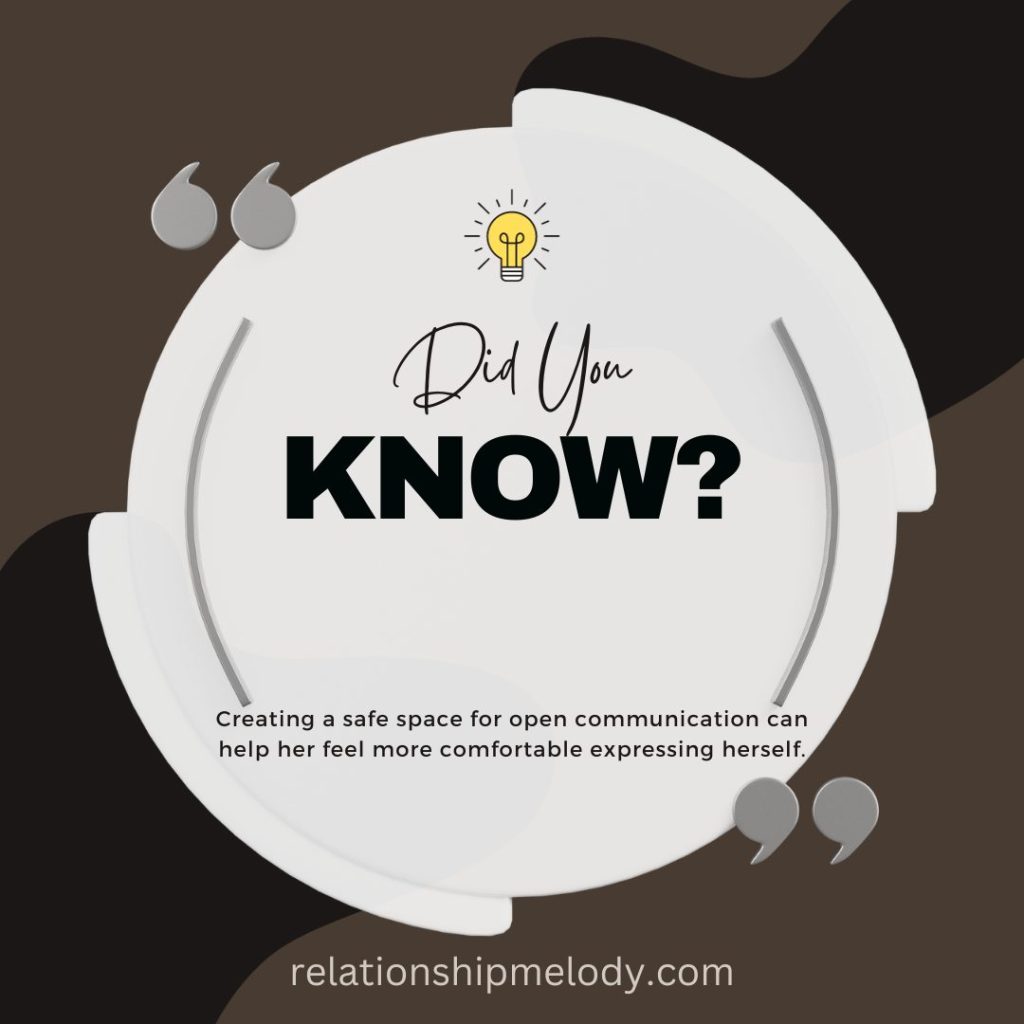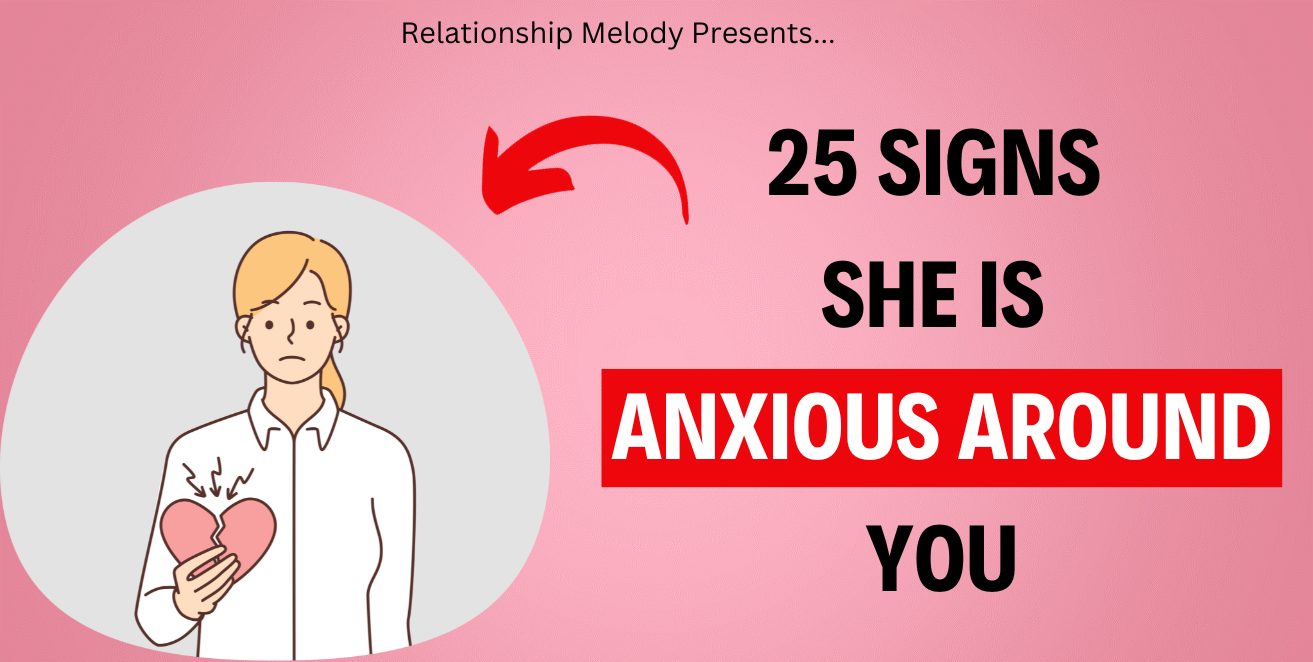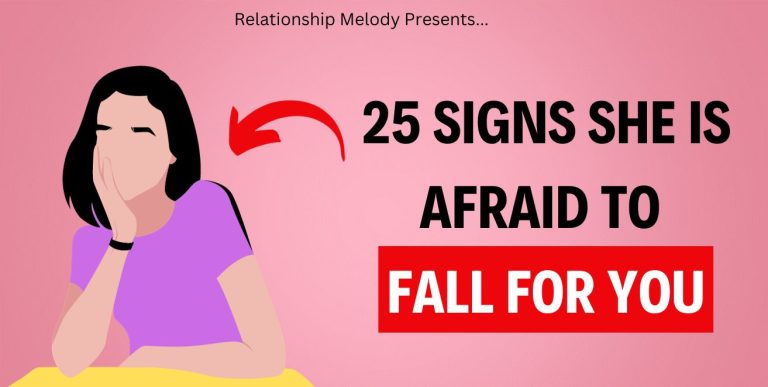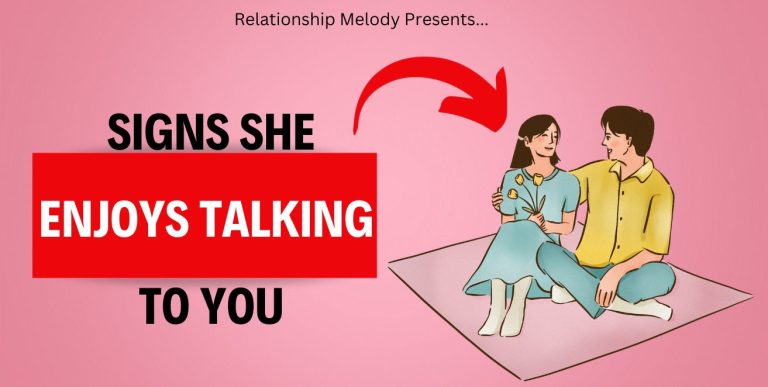25 Signs She Is Anxious Around You
Anxiety can affect individuals in various aspects of their lives, including relationships.
If you suspect that the woman you’re interested in or involved with is experiencing anxiety around you, it’s important to understand the signs and provide support and understanding.
In this blog post, we will explore 25 signs that indicate she is anxious around you.
By recognizing these signs, you can develop a better understanding of her feelings and work towards creating a safe and supportive environment.
Remember, empathy, patience, and open communication are key when navigating a relationship with someone who experiences anxiety.
Let’s dive into the signs and gain insights into her anxious tendencies.
25 Signs She Is Anxious Around You
These are the 25 signs that you need to know.
Sign #1: Avoidance of Eye Contact
When a woman is anxious around you, she may avoid making direct eye contact.
Eye contact can feel intense and intimidating for individuals experiencing anxiety, leading to a desire to look away or divert their gaze.
Sign #2: Nervous Body Language
Anxiety often manifests in the form of nervous body language. She may fidget, tap her fingers, or display restless movements.
These physical manifestations reflect her inner unease and discomfort.
Sign #3: Increased Self-Consciousness
Anxiety can heighten self-consciousness.
She may become overly aware of her actions, appearance, or words, constantly second-guessing herself.
This self-consciousness stems from a fear of being judged or not meeting expectations.
Sign #4: Excessive Apologizing
Anxious individuals tend to apologize excessively, even for minor things.
She may apologize for things that are out of her control or for expressing her thoughts and opinions.
This excessive apologizing stems from a fear of inconveniencing or upsetting others.
Sign #5: Tense or Stiff Posture
Anxiety can lead to a tense or stiff posture.
She may appear rigid or guarded, as her body subconsciously responds to the anxious thoughts and emotions she is experiencing.
Sign #6: Difficulty Relaxing or Unwinding
Relaxation can be a challenge for someone experiencing anxiety.
She may have difficulty unwinding or finding moments of calm when she is around you.
Creating a soothing and supportive environment can help her feel more at ease.
Sign #7: Excessive Worrying
Anxiety often leads to excessive worrying about various aspects of the relationship.
She may constantly worry about the future, the stability of the relationship, or her own actions and behaviors.
This worrying can be overwhelming for her.
Sign #8: Restlessness or Pacing
Restlessness or pacing is a common symptom of anxiety.
She may find it difficult to stay still or sit calmly, as her mind and body are consumed by anxious thoughts and feelings.
Sign #9: Overthinking Interactions
An anxious woman may overthink every interaction she has with you.
She may analyze your words, gestures, and behaviors, searching for hidden meanings or signs of disapproval.
Overthinking can lead to self-doubt and increased anxiety.
Sign #10: Difficulty Expressing Needs or Desires
Expressing needs or desires can be challenging for someone experiencing anxiety.
She may struggle to voice her preferences, fearing rejection or criticism.
Creating a safe space for open communication can help her feel more comfortable expressing herself.

Sign #11: Fear of Rejection or Abandonment
Anxiety often brings a fear of rejection or abandonment.
She may worry excessively about the future of the relationship or interpret certain behaviors as signs of rejection.
Reassurance and consistency can help alleviate these fears.
Sign #12: Excessive People-Pleasing
An anxious woman may engage in excessive people-pleasing behaviors to seek validation and avoid conflict.
She may prioritize your needs and wants over her own, fearing that asserting herself will result in negative consequences.
Sign #13: Difficulty Making Decisions
Anxiety can make decision-making a daunting task.
She may struggle to make even simple choices, as her mind becomes overwhelmed with potential outcomes and the fear of making the wrong decision.
Offering support and understanding during the decision-making process can be helpful.
Sign #14: Fear of Judgment or Criticism
Anxiety often brings a fear of judgment or criticism from others.
She may be overly concerned about how you perceive her and worry about saying or doing something wrong.
Creating a non-judgmental and supportive environment can help alleviate her anxiety.
Read more like this: Signs she is annoyed by you
Sign #15: Increased Sensitivity to Reassurance
When anxious, she may seek reassurance more frequently.
She may need reassurance that she is valued, loved, and accepted.
Providing genuine and consistent reassurance can help ease her anxiety.
Sign #16: Inability to Relax in Intimate Settings
Anxiety can make it challenging for her to relax in intimate settings.
She may find it difficult to let her guard down or fully engage in intimate moments due to heightened anxiety and self-consciousness.
Sign #17: Withdrawal or Social Isolation
When feeling anxious, she may withdraw or isolate herself socially.
She may cancel plans or avoid social interactions, as the thought of being in social settings triggers anxiety.
Understanding her need for space and offering support can help her navigate these challenging moments.
Sign #18: Excessive Need for Control
Anxiety often leads to an excessive need for control as a coping mechanism.
She may try to control various aspects of the relationship or situations to alleviate her anxiety.
Open communication and finding a balance between autonomy and collaboration can be beneficial.
Sign #19: Difficulty Trusting
Anxiety can make it challenging for her to trust others, including you.
She may struggle with trusting your intentions and may question your loyalty or faithfulness.
Building trust requires patience, consistency, and understanding.
Sign #20: Heightened Sensitivity to Changes in Mood or Tone
Anxious individuals are often highly sensitive to changes in mood or tone.
She may interpret subtle shifts in your demeanor as signs of disapproval or dissatisfaction, triggering her anxiety.
Clear communication and reassurance can help avoid misunderstandings.
Sign #21: Excessive Need for Reassurance
Anxiety can create an excessive need for reassurance.
She may seek reassurance repeatedly, seeking validation and confirmation of your feelings and intentions.
Providing patience and understanding while offering reassurance can help alleviate her anxiety.
Sign #22: Fear of Making Mistakes
An anxious woman may fear making mistakes, particularly in the context of the relationship.
She may worry about the consequences of her actions and fear disappointing you.
Creating a supportive and forgiving environment can help her feel more at ease.
Sign #23: Overanalyzing Text Messages or Conversations
Text messages and conversations can become subjects of overanalysis for an anxious individual.
She may read into every word, trying to decipher hidden meanings or cues.
This overanalysis can lead to heightened anxiety and misinterpretations.
Sign #24: Hypersensitivity to Criticism
Criticism can deeply affect an anxious woman.
She may be highly sensitive to criticism, taking it personally and internalizing it as a reflection of her worth.
Providing constructive feedback with sensitivity can be essential in supporting her growth.
Sign #25: Fear of Conflict
Anxiety can bring a fear of conflict.
She may avoid expressing disagreements or concerns, fearing that it will lead to conflict or jeopardize the relationship.
Encouraging open and honest communication while assuring her of your willingness to address issues can help alleviate her anxiety.
Conclusion
Recognizing the signs of anxiety in your partner is crucial for fostering a supportive and understanding relationship.
By understanding her anxious tendencies and offering empathy, patience, and open communication, you can create a safe space for her to navigate her anxiety.
Remember, everyone’s experience with anxiety is unique, so it’s important to approach her individual needs with care and compassion.
With your support, she can feel more comfortable and secure, allowing your relationship to thrive.
Liked Our Article? Feel Free To Support Us
Our Patreon Page: https://www.patreon.com

Welcome to Relationship Melody! Our website is dedicated to all things on relationships, dating, and love! We are passionate about helping you navigate the ups and downs of love, and our goal is to provide you with valuable insights and information that will make your journey toward a fulfilling relationship smoother and more enjoyable.







